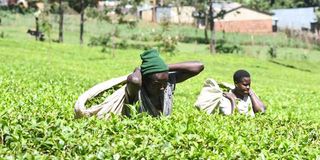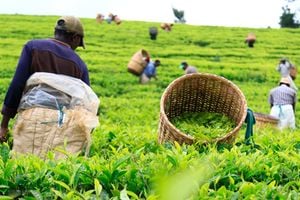
Workers at a tea farm in Kapsabet, Nandi County, in April last year.
Unsold tea stocks valued at nearly Sh32 billion have piled up at the Mombasa Tea Auction following the introduction of a minimum guaranteed price for farmers, putting at stake the livelihoods of millions of farmers.
The auction crisis has set off alarm bells at the Ministry of Agriculture amid delayed payments to farmers, especially in Western tea growing zones such as Kisii, Nyamira and parts of Kericho and Nandi.
The crisis is linked to a stand-off over State-fixed minimum prices at the auction that has left warehouses overflowing with stocks of unsold consignments. Industry estimates show that about 60 per cent of stocks sent to the weekly auction over the past year remain unsold and stashed in overstretched stores.
This means that many firms, as well as the giant Kenya Tea Development Agency (KTDA), are struggling to pay farmers, with some taking loans to offset dues to growers.
Agriculture and Crops Development Principal Secretary Paul Ronoh yesterday confirmed the worsening crisis at the auction.
“We have more than 100 million kilos of unsold tea which is way above the international set standard of about 30 million kilos,” he said when he toured the tea auction yesterday. On Wednesday, he visited the KTDA-run Litein, Kapkatet, Toror and Kaprokoros tea factories that are worst hit by the glut.
“We shall waive warehouse charges as we work around the clock to sell the tea in the next few months,” he added.
The 100 million kilos of unsold tea is valued at about Sh31.58 billion, going by the fixed minimum price of $2.43 (Sh315.87) per kilo of the produce from the western part of the country. The unsold tea is mainly from the west of Rift Valley growing zones.
Admission of a glut
Dr Ronoh’s admission of a glut came less than three weeks after the Nairobi Securities Exchange-listed firms Williamson Tea and Kapchorua Tea recommended the destruction of huge stocks of the unsold commodity held by KTDA to save the industry from being choked by excess supply, which has hurt prices.
The two tea firms said tea prices have fallen to unsustainable levels as a result of market saturation, while also criticising the minimum pricing system that has hit producers who are unable to supply top-grade tea.
“Despite the positive results of the period, the prospects for the company and Kenyan tea industry are dire. Tea prices have declined to unsustainable levels in the face of market saturation and the consequences of an estimated 200 million kilogrammes of unsold KTDA teas,” said Williamson Tea in its financial report for the year ended March.
“Dramatic action is required to enable the market to return to a normal dynamic and for prospects to improve. The destruction of all unsold KTDA teas and the removal of the auction minimum pricing system is needed with immediate effect,” it added.
KTDA denied the claims by Williamson Tea, though insiders confirmed a worsening glut.
The Kenya Tea Growers Association (KTGA), which represents the large-scale plantations, months ago warned that small-scale farmers and producers would go out of business due to the mess, risking damage to the economy of tea-growing areas in western Kenya.
“Much of this tea is made from smallholder farmers’ leaves. They need to be paid. They can only be paid if Kenyan tea is selling above the cost of production. About 40 per cent of smallholder west of Rift tea is unsold and many sales for other producers are below the cost of production,” the lobby warned.
It further urged the government to shelve minimum prices for produce from the west and Rift Valley growing areas to help improve the purchase of the massive stocks held up in warehouses.
“We recommend the removal of at least the west of the Rift from smallholder minimum pricing. Regulate the shipment of all reprinted/unsold tea to Dubai to stop Pakistan blenders cashing in and exploiting the current situation of unsold stock,” KTGA stated in a proposal.
“Anything on or above a value of $2 sold can be shipped but properly reviewed and policed every month. Re-orientate marketing so that the millions of unsold smallholder kgs in stock are taken off the existing market circuit. Discount and sell to African destinations through Kenya or burn, or throw on tea fields. Once the backlog is cleared, return to an orderly marketing structure,” it added.
Two-day format
The Mombasa auction runs on a two-day format where secondary grade tea is sold on Mondays and premium grade ones on Tuesdays.
Any tea that is not sold on a scheduled auction day is reprinted on a fresh auction catalogue and returned to the auction two weeks later. A seller can only bring back unsold produce to the auction twice.
Auction data from Mombasa shows that during the July 22 and July 23 auctions, 60.01 per cent of tea went unsold.
Any tea not sold after two auction trials is relegated to a sale window referred to as a “passive window” where produce fetches low prices on perceived low quality.











